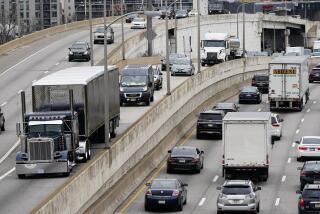Anti-Lock Brakes Slammed by Insurance Study
- Share via
Safety sells cars. So, it’s not surprising auto makers are rushing to satisfy consumer demand, outpacing even federal safety regulations enacted in past years when the industry often fought stiffer rules.
A device that has become the Holy Grail of auto safety is the anti-lock brake system, a tricky piece of technology that prevents wheels from locking on wet or icy roads.
The selling point of these systems is that they are supposed to prevent motorists from losing steering control and make quicker stops in slick conditions. They are also touted as a benefit in emergency stops on dry pavement.
Anti-lock brakes have become so popular that General Motors has made them standard equipment on virtually all its cars. But a new study suggests anti-lock brakes don’t deliver the safety benefits consumers believe.
In a key report based on accident data, the Insurance Institute for Highway Safety says anti-lock brakes do nothing to reduce fatalities and nothing to reduce automobile accident claims.
The group, funded by contributions from auto insurance companies, compared accident and insurance loss data for cars equipped with anti-lock brake systems to the same models with standard brakes. The findings were that claim frequency and the average amounts of insurance payments were the same.
The institute charges that auto makers have engaged in misleading commercials that imply that anti-lock systems can prevent crashes because of their better stopping power.
“They have been marketed as an alternative to air bags,” says institute spokesman Chuck Hurley. “People think if they have bought a small car with anti-lock brakes, they are protected. Well, that’s not true.”
Auto makers have attacked the study, saying that it is based on a very small sample of cases and that research proves anti-lock systems are effective.
“We think anti-lock brake systems are a terrific feature,” says Pam Kueber, a Ford spokeswoman. “The customer is voting with his or her dollar that they want anti-lock brakes. It keeps your car from spinning out when you brake. It is a safety feature.”
Ed Lechtzin, a General Motors spokesman, contends that the study was based on “cursory data.”
Anti-lock brakes work by preventing wheels from locking, which can increase stopping distance and result in a loss of steering. The systems have motion sensors on each wheel, which report to a central computer if a wheel has stopped rotating.
The computer then instructs the hydraulic system to reduce the pressure momentarily to that wheel. The action is similar to pumping the brakes, but it is much faster and more effective.
Hurley says consumers should apply their money to larger cars rather than pay up to $500 for anti-lock brakes. The institute asserts that an accident in a small subcompact has double the risk of a fatal injury over a similar accident in a full-size car.
According to the institute’s data, there are 2.4 fatalities for every 10,000 vehicles shorter than 95 inches in wheel base. By comparison, cars with more than 114 inches of wheel base have 1.1 fatalities for every 10,000 vehicles.
Car companies hate to be asked about the relative merits of size over anti-lock brakes because under federal law, they must meet ever stricter fuel economy standards. They can meet those goals only by selling a larger proportion of small cars.
“I am not going to get into that discussion at all,” Lechtzin says.
The Safety Institute says consumers may still want to buy anti-lock brake systems, but that larger cars and air bags make a bigger contribution to safety.







